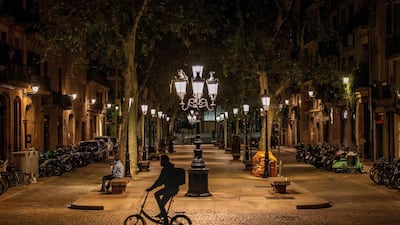Protests have erupted in Europe as governments moved to impose fresh lockdowns to halt a surge in coronavirus cases.
Germany will impose an emergency lockdown, it emerged on Wednesday afternoon, after Chancellor Angela Merkel agreed with regional leaders to take national action to prevent hospitals being overwhelmed.
And in France, President Emmanuel Macron ordered a return to lockdown.
"The virus is circulating at a speed that not even the most pessimistic forecasts had anticipated," Mr Macron said in a televised address. "Like all our neighbours, we are submerged by the sudden acceleration of the virus."
"We are all in the same position: overrun by a second wave which we know will be harder, more deadly than the first."
Under the new French measures which come into force on Friday, people will be required to stay in their homes except to buy essential goods, seek medical attention, or exercise for up to one hour a day. They will be permitted to go to work if their employer deems it impossible for them to do the job from home. Schools will stay open.
In Germany, the precise lockdown measures were still being negotiated but Ms Merkel's push for a "lockdown light" was met with immediate protests in Berlin from bar and restaurant owners, whose businesses are expected to be closed.
The aim is to "break the infection momentum, so that over Christmas, there will be no far-reaching restrictions with regards to personal contact and economic activities," a draft proposal said.
It went on: "Family and friends should be allowed to meet under corona-conditions over Christmas. This requires a common effort now, just like in the spring.”
Germany recorded a record 14,964 new infections on Wednesday.
Mrs Merkel warned the country’s health system could hit breaking point if coronavirus infections continue to spiral.
The presidential address came after a government spokesman warned the number of Covid-19 patients in intensive care was two weeks away from hitting the same level as the April peak without any new restrictions.
On Monday, the head of the government’s virus advisory body, Jean-François Delfraissy, said France was in a “critical” situation and expressed surprise at the “brutality” of the second wave.
He added that it was likely France was already recording 100,000 cases per day.
In Italy, police used tear gas against protesters for the second night in a row.
The protests were sparked by the night-time curfew that orders bars and restaurants to close from 6pm.
Italy on Tuesday recorded more than 200 virus deaths for the first time since mid-May.

Protests also broke out in Barcelona, Spain, where a nation-wide curfew and state of emergency is in place.
Many of the demonstrators were calling for greater investment in public services as the country endures the second wave of the pandemic.
In the UK, Boris Johnson faced renewed pressure to impose a national “circuit-breaker” lockdown as a former chief scientific advisor warned Covid hospitalisations were on track to more than double by the end of next month.
The PM, who has resisted calls for a second lockdown but declined to rule it out, was also told the UK’s second wave could be deadlier than the first.
Modelling provided by the government’s Scientific Advisory Group for Emergencies (Sage) showed that deaths would peak at a lower level than the spring but persist for weeks or months - in contrast to the sharp fall of the first wave.
Speaking on BBC's Radio 4 Today programme, Sage member and ex-chief scientific adviser Professor Mark Walport said the number of people in hospitals with coronavirus could more than double to 25,000 within weeks.
He said: "France, which has a very similar population to us, currently has about 16,000 people in hospital. It’s got 2,500 in intensive care beds compared with 852 here and roughly half the ICU beds in France are occupied. We’re seeing similar things in Spain.
“And these are in spite of these countries taking strong measures as well.”
Mr Johnson is facing calls to push for standardised coronavirus restrictions across the UK in time for Christmas. Two minor parties, the Liberal Democrats and Alliance Party of Northern Ireland, said extensive travel between the UK’s four nations was “inevitable” over the festive season.
However, Environment Secretary George Eustice told the BBC “it’s too early to say what restrictions will be in place”.
He warned families "may not be able to get together in the larger groups that they normally would".
The UK reported 367 new deaths from coronavirus on Tuesday, the highest daily total since the end of May, and a further 22,885 new cases.
The total death toll also surpassed the alarming milestone of 60,000.
In Belgium, Europe’s worst coronavirus hotspot, hospital admissions soared to record levels overnight.
The country now has 1,390 Covid cases per 100,000 people – far outstripping other hotbeds such as France and Spain.
Doctors in the city of Liege were asked on Tuesday to keep working even if they have coronavirus.
Swiss hospitals were scrambling to cope with a surge in new coronavirus patients, bringing back retired staff to replace sick frontline workers and closing other wards as officials warned they could reach breaking point in about 10 days.
Even Sweden, which refused to impose a nationwide lockdown in the first stage of the pandemic, is now introducing new restrictions after a 70-per-cent jump in new cases in one week.























